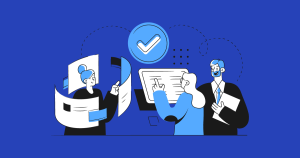Tax Tips for Small Business Owners
- March 15, 2023
- 5 min read
Are you a business owner who always dreads the end of the financial year?
Do you get so stressed out trying to navigate the complex world of taxes?
Do you feel that you are paying more in taxes than larger businesses due to their limited resources and ability to take advantage of tax breaks and deductions?
Well, we’re about to change this with our tax tips!
Yes, really.
Any kind of entrepreneur can benefit from using tax tips, regardless of the size or their business structure. Entrepreneurs who are starting a new business, small businesses, or even growing a large enterprise can all benefit from using tax tips to save you time and money on taxes and stress during tax time and beyond.
So, let’s dive in and discover how to make the most of your tax return and pay less tax!
Overview:
- Tip 1. Separate business and personal finances
- Tip 2. Keep good records
- Tip 3. Pay estimated quarterly taxes
- Tip 4. Review your invoicing
- Tip 5. Pre-pay your expenses
- Tip 6. Make use of depreciation
- Tip 7. Know what’s tax-deductible
- Let Sleek help you with managing your accounting
Tip 1. Separate business and personal finances
Separating your business finances from your personal finances (a different bank account is highly recommended!) is an important step for any entrepreneur to take to save on taxes.
Here’s why separating your finances is so important –
It can maximise your deductions:
When you separate your business and personal finances, it becomes easier to track and document your expenses. You are then able to identify all of the expenses that are eligible for tax deductions, which can help you boost your deductions and lower your taxable income.
Curious about the tax deductions for tradies? Click to find out more.
Avoids personal expenses:
When you mix your personal and business finances, it can be difficult to distinguish between personal expenses and business expenses. This can lead to the accidental claiming of personal expenses as business expenses. Separating your finances can help you avoid this mistake and ensure that you are only claiming legitimate business expenses.
Simplifies your record keeping:
When you have separate business and personal finances, it becomes easier to keep track of your financial records and receipts. This can help you stay organised and reduce the risk of errors or omissions on your tax return.
Tip 2. Keep good records
Keeping good records can save you money in taxes in a few ways:
Accurate tax returns:
By keeping good records of your income and expenses, you will have all the information you need to file your tax return accurately. Keeping good tax records will help you avoid errors that could lead to penalties or additional taxes owed.
Claim deductions:
Keeping track of your business expenses allows you to claim deductions that you are entitled to, reducing your taxable income. For example, if you are self-employed and work from home, you can deduct a portion of your home expenses, such as rent, utilities, and insurance, as a home office deduction.
Identifying trends:
By tracking your income and expenses over time, you can identify trends in your business and make informed decisions about future investments or changes. This can help you maximise your profits and reduce your tax liability.
Tip 3. Pay estimated quarterly taxes
Paying your estimated quarterly taxes saves on taxes by:
Reducing taxes owed:
By paying estimated taxes, you can reduce the amount of taxes you owe at the end of the tax year. This can be particularly helpful if you have a large tax bill that you cannot pay all at once. By spreading out your payments, you can reduce the amount of interest and penalties you would otherwise owe.
Avoiding penalties:
If you are self-employed or have other sources of income that are not subject to withholding taxes, you may need to pay estimated quarterly taxes to avoid penalties. The ATO requires taxpayers to pay taxes throughout the year, either through withholding or estimated taxes. By paying estimated taxes, you can avoid underpayment penalties and interest charges.
Smoothing out cash flow:
Paying estimated taxes can help you manage your cash flow more effectively. Rather than waiting until the end of the year to pay your taxes, you can spread your payments out over the year, which can help you avoid cash flow problems and budget more effectively.
Tip 4. Review your invoicing
Reviewing your invoicing on a regular basis will help you save on taxes in a few ways:
Give you accurate income reporting:
By reviewing your invoicing, you can ensure that you are accurately reporting all of your business income on your return. This can help you avoid penalties or additional taxes owed due to underreporting of income.
Maximising your deductions:
By reviewing your invoicing, you can also identify all of the expenses associated with each sale or service, allowing you to maximise your deductions. For example, if you travel to provide a service, your travel expenses may be a tax deduction.
Help you identify errors:
Reviewing your invoicing can also help you identify errors, such as double billing or incorrect charges, which can lead to overpayment of taxes. By catching these errors early, you can claim only qualified business income and avoid paying more taxes than you owe.
Manage the timing of income recognition:
Reviewing your invoicing can also help you manage the timing of your income recognition, which can impact your tax liability. For example, if you have the option to invoice a client in December or January, you may want to delay the invoice until January to reduce your business income in the current financial year.
Tip 5. Pre-pay your expenses
Pre-paying expenses is a great way to help you save on taxes. Here’s how it works –
Maximises deductions:
Pre-paying expenses allow you to take advantage of tax deductions earlier, which can help you maximise your deductions for the year. For example, if you pay for a business expense in December but do not receive the goods or services until the following year, you may be able to deduct the expense in the current year.
Reduces your taxable income:
A little tax planning by pre-paying expenses can also help you reduce your taxable income. By pre-paying expenses, you can reduce your taxable income in the current year, which can help you save on taxes.
Allows you to take advantage of discounts:
Pre-paying expenses may also allow you to take advantage of discounts or special offers. For example, if you pre-pay for a service or product, you may be able to receive a discount or avoid price increases.
Tip 6. Make use of depreciation
Still with us? We know this is tough but can be so worth it.
Claiming depreciation on business assets can help you save on taxes in a few ways:
Reduces your taxable income:
Depreciation is an expense that reduces your taxable income, which can help you save on taxes. By deducting the cost of an asset over its useful life, you can reduce your taxable income for each year that the asset is in use.
Maximises your deductions:
Depreciation allows you to maximise your deductions by spreading the cost of an asset over several years. By taking a portion of the cost each year, you can reduce your tax liability and maximize your deductions.
Improves cash flow:
Depreciation can also help you improve your cash flow by reducing the amount of tax you owe each year. By reducing your tax liability, you can keep more cash in your business, which can be used for other expenses or investments.
There are many claims offered to reduce business tax – look into simplified depreciation rules, instant asset write off or temporary full expensing.
Not sure what depreciation or depreciating assets are? Our article on Tax Depreciation will help explain it!
Tip 7. Know what’s tax-deductible
Knowing what’s tax-deductible can help you save on taxes in a few ways:
By maximising your deductions:
By understanding what expenses are deductible, you can ensure that you are claiming all available deductions on your return. This can help you maximise your deductions and reduce your taxable income, which can ultimately lower your tax bill.
By avoiding mistakes:
Knowing what’s tax-deductible can also help you avoid mistakes on your tax return. By understanding the rules around deductions, you can avoid accidentally claiming expenses that are not deductible or failing to claim expenses that are deductible.
Reduces your tax liability:
By taking advantage of all available deductions, you can reduce your tax liability and ultimately save money on small business tax. This can help you improve your financial health and free up funds for other business expenses or investments.
Make informed decisions:
Knowing what’s deductible can also help you make informed decisions about business expenses. By understanding which expenses are deductible, you can make strategic decisions about spending and investing that can help you save money on taxes.
Let Sleek help you with managing your accounting
Still think you need help with your small business tax? Leave it to a Sleek accounting tax professional.
Here’s how we can save from paying too much tax regardless of your business structure –
Using automation in bookkeeping and accounting: Sleek tools can help automate bookkeeping and accounting tasks, which can save you time and money. Accounting software streamlines these processes, you can reduce the risk of errors and ensure that all expenses are accurately recorded and classified, which can ultimately help you maximise your deductions and save on taxes.
By providing real-time insights: Sleek tools can also provide real-time insights into your financial data, which can help you make informed decisions about expenses and investments. By having access to up-to-date financial information, you can make strategic decisions that can help you save money on taxes (and improve the overall financial health of your small business!).
By simplifying your tax compliance: Sleek tools can help simplify tax compliance by automating the calculation and filing of taxes. By using software that is designed to comply with tax laws and regulations, you can reduce the risk of errors and ensure that you are meeting your tax obligations. This can help you avoid penalties and fines and ultimately save money on taxes.
By maximising your deductions: Sleek tools can also help you maximise your deductions for eligible businesses by providing real-time insights into your financial data. By having access to accurate and up-to-date information about your expenses and tax planning you can identify areas where you may be able to claim additional deductions, which can ultimately help you save on taxes.
Remember, having to pay tax is a necessary part of running a business, but you can certainly minimise your small business taxes by staying organised, taking advantage of deductions – and seeking professional advice with Sleek. Don’t wait for tax season, call us on +61 2 9100 0480 or schedule an appointment now!
You might be interested in reading about:






